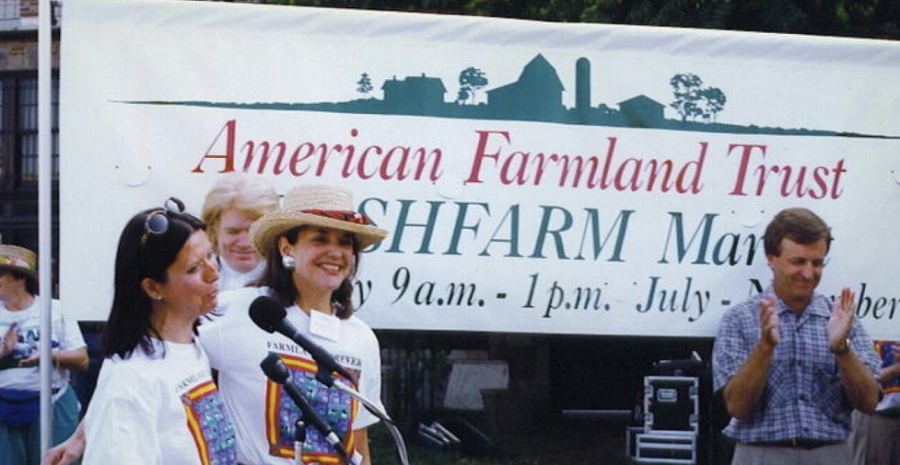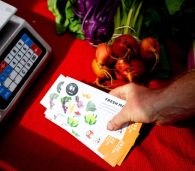FRESHFARM at 25: A Conversation with FRESHFARM Co-Founder Bernadine Prince

To celebrate our 25th anniversary, we will be sharing stories throughout the year from our community of farmers, producers, FoodPrints teachers and students, shoppers, gleaners, and beyond about FRESHFARM.

Co-Founder of FRESHFARM
We caught up with Bernadine Prince, who co-founded FRESHFARM with Ann Harvey Yonkers, to learn about the genesis of this amazing organization. Prince, who retired from FRESHFARM in 2015, started Blue Skies Farms in Delaware with her husband Ray, and recently moved to Loudoun County, Virginia to be closer to their beloved granddaughter Phoebe. Bernie and Ray are busy planning how to use their three acres for growing perennial flowers and seasonal foods and planting a truffle orchard. They joined a local food co-op and have been exploring the back roads and bike paths near their Purcellville home.
Be sure to also read our interview with Ann Harvey Yonkers. Each of these food system trailblazers has a unique perspective about FRESHFARM’s legacy, and we wouldn’t be where we are today without their vision and hard work.
FRESHFARM: What were your objectives and goals when you opened the Dupont Circle farmers market?
Bernie: We wanted Mid-Atlantic farmers to have an outlet to sell directly to the public in the DC metro area. There were a few other markets, but for the most part there was nothing like a producer-only farmers market in DC. At one DC market, I asked the vendors about their farms and they told me they were not farming, they were reselling the products they brought to market.
We also wanted to use markets as a platform to educate people about food and farming, what was going on in the Mid-Atlantic and nationally with farmland loss, and what farmers were facing to be able to sell directly. Local farmers were fighting against conventional farmers or commodity growers, and there wasn’t a lot of local food coming into DC at the time.
When you meet the farmers you start to realize how vitally important it was to start something like the Dupont Circle market to make sure they could survive economically. You can save the farmland but you have to keep the farmer on the land. Staying on the land means keeping farming economically viable.
I was on the staff of American Farmland Trust (AFT), so they were the initial sponsor of the Dupont market. I had worked with two board members at AFT who were incredibly supportive: Tony Lapham and Jean Wallace Douglas were so excited about having local food in DC. Both of them cheered us on and supported FRESHFARM financially from the start and when we left AFT. As we presented our idea of a producer-only farmers market in the Dupont community, we found others who urged us on. We were introduced to Betty King who had been Marion Barry’s Deputy Chief of Staff and who helped us get through muddy DC bureaucratic waters to start the market in July 1997.
FRESHFARM: When thinking of how you were going to structure the farmers market, what were the important factors and influences?

Bernie: Ann Yonkers had done a market feasibility study, funded by a foundation that Chef Nora Pouillon served on, to determine where to start a producer-only farmers market in downtown Washington, DC. That’s the point that I met Ann and we worked together to get the market launched under AFT.
The NYC Greenmarket was a big influence because that’s the one that inspired Nora to say that we needed a farmers market like it in DC. The Greenmarket saved the farms in the watershed of New York State, and it’s an incredible model and was one that was pretty easy to follow. We also talked to farmers, including Chip and Susan Planck of Wheatland Vegetable Farms, who were selling at the Arlington farmers market, and Jim and Moie Crawford of New Morning Farm. They told us that farmers wanted structure, they wanted markets to be organized, they wanted someone else to run them so they could spend the time farming and selling at a producer-only market but not have to do the business of running a market.
There were also those models that were not so good. The commitment we made to the Dupont Circle community was that we would not be a craft market. The community specifically wanted it to be a local food market.
FRESHFARM: When you started FRESHFARM, what were the biggest barriers that you needed to overcome?
Bernie: There were a lot of issues about using public space for farmers markets. Nothing in the Washington, DC rules and regulations fit a farmers market. Nothing. So when we went to the DC government, they were very mystified on why they should even give permission. They were used to treating every use of public space as a special event. It took years for DC to come up with a separate license for farmers markets.

We started in 1996, and it took almost a year to get all of the support we needed. We had a lot of good support, it just took time. And then we needed to recruit the farmers. The first year we had 15 farmers, and I believe seven or eight of those farmers are still at the Dupont market. That first year, we wanted to open the 4th of July weekend. It was a good year of growing, and we wanted the stands all full of food. Since it was a holiday weekend, there was not much going on, so we had TV crews at the market, it was fantastic. News about the Dupont market was on TV all day long! That first year we also gleaned from the market. Our first gleaner was DC Central Kitchen. It was small amounts of farmer food donations at the beginning, but today gleaning is done at every FRESHFARM market.
Once the word got out about the Dupont farmers market, we had farmers calling up actually saying “I really want to be in that market.” The word was out in the community that there’s something happening with local food and farmers in DC.
I still get a big thrill out of seeing the market tents at the Dupont market when I visit DC on Sundays. I get excited because I remember how it took so much energy and positivity to fight through the system to get it there. In the end, it was very positive in the community and it showed the city that we were serious. After that the city actually began to come to us. That’s how the H Street NE market opened. The city came to us and said, you know there should be a farmers market down there for the community.
FRESHFARM: Stepping back and taking a broader view, what are the biggest changes that you’ve seen in our regional system since FRESHFARM started?
Bernie: One is that the Dupont Circle market, and even FRESHFARM, are used as models. People that want to start markets look at our rules and regulations, they see how we recruit farmers, how markets are set up. Even the folks from USDA come to our markets. That’s truly outstanding!
Now what we need to see, in my opinion, are more outlets for farmers: CSA drop-offs, or a food co-op here that they can be part of, or restaurants or schools they can sell to, so farmers can expand their businesses.
Another big thing that I see being done differently now is more diversity in who’s selling at market, especially at Dupont. Diversity was something that we wanted but trying to find the farmers, trying to get it all in place — it was very difficult to check all the boxes at once. But when I go to DC markets and see the farmers and the diversity, I am so proud.
The key thing now is that we need new farmers and to make sure farmers have land to grow on. Think about it: if more cities looked at farmers markets and said, let’s set aside space for use as a farmers market, wouldn’t that be outstanding? “No farms, no food” is a really great slogan but let’s have it be grounded in legislation. There needs to be a push for communities to do more with the local food and farmers and build that connection and make that connection stronger.
FRESHFARM: Of your many accomplishments at FRESHFARM, what are you most proud of?
Bernie: I’m really proud of the Dupont market, and that it’s still going strong and there are nearly 30 FRESHFARM Markets! I’m really proud of the current management of FRESHFARM, that despite the COVID regulations and the restrictions, Dupont continues to be a successful market. I am also proud that FRESHFARM accepts nutrition benefits and that in 2009 we were the first farmers market in Washington, DC to offer an incentive program, Double Dollars (now Fresh Match).
The other thing that I’m very proud of is creating the FoodPrints program, and I wish we had started that program earlier. We started out small with one school in Ward 4 and that school doesn’t even exist anymore, but there are now 19 FoodPrints partner schools in DC and over 7,000 students! So in retrospect: It was a huge step to start in the Dupont market, to get SNAP benefits accepted, and then to say we’re interested in teaching children in schools how food works by creating school gardens and a curriculum that matches what they’re learning in math, science, and humanities.
I think about what farmers and producers have said to me: “without this market we wouldn’t have been able to survive and we would have had to sell the farm. FRESHFARM made me think about how I could expand my farm and how I could do even more.” FRESHFARM is an organization that really started from the bootstraps to connect farmers, food, and community, and make a difference for the health of that community, the longevity of the farmer, and the future of farming in our region.

